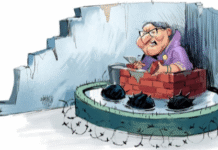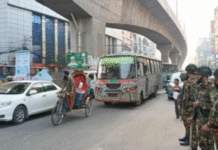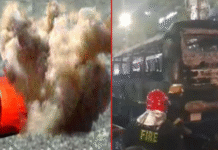Teenage gang crimes on the rise in Chittagong city

“Exposure to aggressive media content and lack of parental supervision is giving rise to hooliganism in the society”
Criminal activities committed by gangs of teenagers are on the rising curve in the port city of Chittagong.
In a latest development, the police have come across a criminal gang of teenagers, while investigating a mysterious death of a rickshaw-puller in the Hazipara area of Double-Mooring police station in the port city.
On May 14, a rickshaw puller identified as Raju, 20, was indiscriminately stabbed in the head, thigh, chest and face. He later succumbed to his injuries at the Chittagong Medical College Hospital.
On April 27, the police arrested a drug dealer identified as Chhagir Hossain with yaba pills, a gun and two cartridges from the Hazipara area in the city.
Chhagir began to suspect his close associate Mofiz for his arrest. So, when his gang members came to visit him in jail, he instructed them to kill Mofiz.
Accordingly, they went to kill Mofiz with sharp weapons, but they went after the wrong target in darkness and stabbed Raju indiscriminately.
Amena Begum, CMP Additional Commissioner (Crime & Operation) confirmed the matter and said following the incident the teenagers were arrested from different parts of the city.
The arrestees were identified as Shimul Das, 20, Tanvir Hossain, Sifat, 18, Sujan alias Modhu, 18, Raquib Hossain alias Shah Raquib, 18, Nur Nabi, 18, Mehedi Hasan Rubel, 18 and Osman Haider Kiron, 18.
“The gang of teenagers were all found to be drug addicts. Three knives, a kirich (a type of knife) and a Chinese axe which were used as murder weapons were recovered from their possession,” said the Additional Commissioner.
In conversation with Dhaka Tribune, Premier University Vice-Chancellor and renowned sociologist Prof Dr Anupam Sen said that children are easily influenced at this impressionable age.
“The portrayal of heroism in relation to violence in the mass media and the culture of impunity, both significantly make an impression on teenagers. The law enforcement agencies should apprehend the “Boro Bhais” (Big Brothers), who are roping these premature teenagers into criminal acts,” said Dr Sen, adding that we must hold fast to our traditional family values to combat juvenile delinquency.
Speaking to Dhaka Tribune, Associate Professor Afzal Hossain of the psychology department at Chittagong University said: “Gang culture is not a new phenomenon to society. But the juvenile gangs acting out so violently to the point of committing murder is an alarming issue.
“They are also often seen using firearms in criminal acts, which should not be so easy to acquire.”
“Youngsters are usually unaware of the consequences of breaking the law. The delinquent acts are often committed under the direct and indirect orders of influential people.”
“So, those who pull strings behind the scenes should promptly be brought to book to curb teenage gang culture.”
According to sociologists and psychologists, lack of parental guidance, fragile family bonds and moral degradation, false sense of heroism, culture of impunity, peer pressure, substance abuse and disadvantaged socio-economic status contribute to the growing incidents of juvenile violence.
Paruma Begum, Chittagong district probation officer of the Social Welfare Directorate said: “Exposure to aggressive media content and lack of parental supervision is giving rise to hooliganism in the society.
“We are gravely worried about the increase in criminal behaviour among teenagers and young adults. We underestimate minors, thinking they cannot commit serious offences, but the reality is just the opposite,” she said.
“Statistics on juvenile offenses are not available to police since the criminal records are not kept separately for young offenders. There is no in-depth study on this topic in Bangladesh. However, it is beyond doubt that crimes committed by the teenagers are on the rise in recent times,” said Mahabub Ul Alam, district in-charge of Aparjeyo-Bangladesh, an organization working for children’s rights.
“The juvenile correctional facilities in the country exist on paper only. The facilities should be developed into proper functioning institutions. Cases filed for juvenile delinquency should be disposed of without delay if we want to see a fall in teenage offenses,” said the rights activist.









